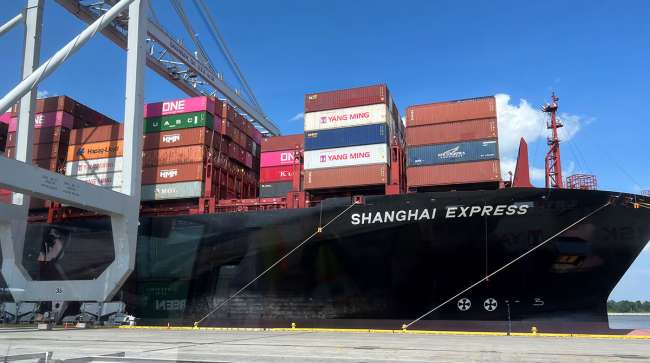Senior Reporter
Expanding Business in a Slow Economy

[Stay on top of transportation news: Get TTNews in your inbox.]
SAVANNAH, Ga. — Now is the time for carriers to position their operations for a long-term balanced marketplace, as declining freight volumes in the post-COVID era signal a return to more normalized demand, logistics experts said.
“When the market is not going well, you have to go back to basics,” said Ryan Mann, marketing manager for Dallas-based freight brokerage and business-to-business transportation company Leans Solutions Group.
Mann made his remarks at the Transportation Marketing and Sales Association’s annual Elevate conference. “We realized that all this momentum we had been building the last three years — we realized it was going to get a lot harder. It was a lot easier in 2020, 2021 and the first half of 2022,”
Ryan told attendees at the conference, held June 11-13, that his company during the pandemic grew from 1,200 employees to 10,000 as business opportunities surged. More recently, it has had to adjust its strategy. “When we realized a downturn was coming, we repositioned our company,” he said. “We worked on our key messaging, and we identified new target markets, and we implemented new tools to get better data and be as efficient as possible.”

Derks
“We’ve come out of a COVID and a post-COVID period where, if you think about the supply chain then, we were the heroes and we were essential — getting the necessary, food, medicines and supplies to survive,” said Mark Derks, TMSA president and BlueGrace Logistics chief marketing officer. “Supply and demand is pretty much in a balanced position, and the elasticity of the supply chain is coming back a little.”
The upshot, experts said, is managing expectations away from the record quarterly profits some firms saw during the pandemic to an environment of slower, steady growth that could stretch over several years. And one way for transportation businesses to improve their bottom line is through expanding the diversity of their workforce, said Eileen Dabrowski, director of learning, development and marketing with Reed TMS Logistics and a TMSA board member.

Dabrowski
“It starts with bringing home the [return on investment],” she said. “What is the ROI of diversity, equity and inclusion? The biggest is retention — less attrition. If someone doesn’t feel safe, welcome and included in an organization culture, they’re going to leave and find a company that supports them.”
Dabrowski stressed that a more diverse workforce, which includes more women and people from underrepresented communities, brings varied viewpoints to a company.
“You don’t just want companies that are surrounded by people who have had the same life experiences. You want people who are going to challenge you,” she said.
Join us Wednesday, June 28th 12 p.m. ET for a #TMSAElevate Debrief Webinar. TMSA Executive Director Jennifer Karpus-Romain and some key members will break down the top takeaways from conference! Register here: https://t.co/at6FvrIq8M pic.twitter.com/7RzUTr0uzV — TMSAtoday (@TMSAtoday) June 20, 2023
Dabrowski added that companies also must emphasize safety — including physical safety and cultural safety — where individuals are encouraged to grow in their careers.
“Getting people to think about diversity is more than ethnicity,” she said. “The research shows that happier people are going to produce more. Happy people produce 15% more than unhappy people.”
Want more news? Listen to today's daily briefing below or go here for more info:




